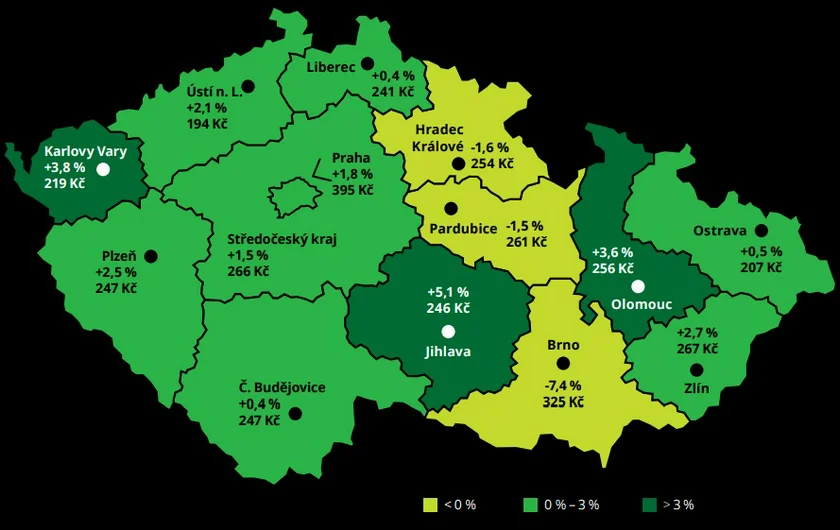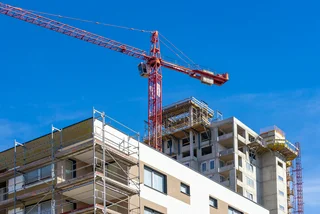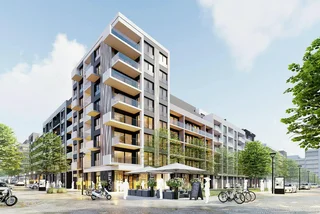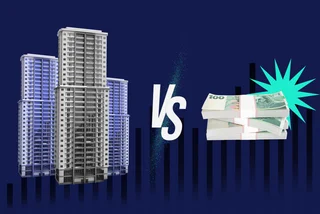Experts predict significant changes to Czechia's rental market in 2024, including rising apartment prices. The Czech Rental Association (ANB) forecasts tens of thousands more renters, increasing demand in cities already facing shortages.
This and high mortgage rates – pushing more people to rent – will likely drive up prices. Key trends include a shift as institutional landlords grow and new commercial housing developments provide more rental options, especially outside city centers.
Where will rents cost the most in 2024?

In Prague, the cost of rental housing is constantly increasing, with tenants now paying an average of CZK 395 per square meter (sqm) as of the end of 2023. This means that renting a 50-sqm apartment in Prague would cost around CZK 20,000 per month. However, in other cities such as Hradec Králové, a consumer can rent an 80 sqm flat for the same amount.
"Apartment prices bottomed out in 2023 and will not go any lower," the ANB notes regarding property-purchase (rather than rent) prices. Higher selling prices – the ANB says they could rise by up to 10 percent in 2024 – will lead to higher rent levels.
Jan Rafaj, ANB presidium member"The increased interest in rental housing that has started will become a permanent trend, and in 2030, around 25 percent of people in the Czech Republic may live in a rental [apartment].”
Better quality and furnished apartments
The ANB says that, owing to the expected growth of institutional landlords (such as banks and insurance companies), the quality of housing and services will rise. "[This] will decide the success of rental housing in the future,” the ANB adds.
PARTNER ARTICLE
Individual landlords and cities in their municipal apartments will have to adapt" to changes in the market, notes ANB vice president Tomáš Kašpar. Due to quality increases in commercial renting and new developments, this could contribute to a growth in rental prices in 2024.
The ANB also notes that nowadays, more people – especially Generation Z – are willing to pay extra for fully furnished apartments. When demand exceeds supply, it can lead to an increase in prices.”
Continued price strain on renters
The implementation of the government’s austerity package and other potential legislative changes may lead to an increase in housing costs for individuals. According to ANB presidium member Jan Rafaj, these measures could result in an average rise of CZK 2,000 for a 60 sqm centrally heated apartment, with an even more significant increase (around one-third) in Prague.
The end of government subsidies for energy bills and abolishing the price ceiling for electricity and gas may also harm consumers, leading to higher bills.
Relocating and downsizing
Due to the skyrocketing rental prices, the ANB has observed that more people are opting to move to the outskirts of major cities to save money on rent and are willing to commute longer distances. This trend is especially noticeable among workers in Prague who have to travel to Central Bohemia for work in the capital.
Further, more commercial residential developments built outside city centers will help boost apartment availability.
The downsizing of flats (making them smaller when building them), which has become increasingly prevalent in recent years, will also increase, according to the ANB. The statement highlights Czechia’s rising need for rental properties and the diminishing supply.
Legislative help for renters?
As part of a joint research study with Czech Radio, Daniel Prokop of PAQ Research identifies an evident lack of apartments nationwide. He believes a change in Czechia’s tax code, which would motivate owners to lease empty apartments, would help. A clampdown on short-term rentals – such as those offered by real estate platforms Airbnb and Booking – would also ease the shortage of housing in large cities, according to Prokop.
Additionally, while the Civil Code limits rent increases to 20 percent over three years, this does not always protect tenants from sharp price jumps. Landlords commonly offer one-year leases, freeing them from restrictions after that. The Ministry for Regional Development proposes addressing consecutive fixed-term contracts that entail price jumps to counter this.
The government plans to launch a price map to address housing affordability issues in the Czech Republic. This map will provide information on the market rent prices in all regions of the country, which will help authorities and municipalities to build affordable housing and determine housing allowances more accurately.
STATE AID
You may be entitled to state housing allowance if your total household income does not exceed a specific proportion of your apartment rental value. Find more information here, and use the Ministry of Labor’s calculator to see if you can claim something.












 Reading time: 3 minutes
Reading time: 3 minutes 



























